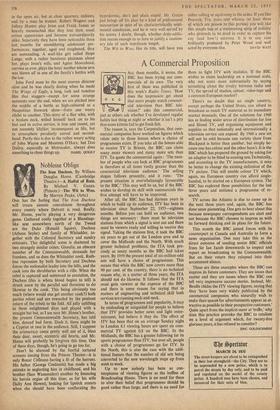A Commercial Proposition
ALL these months, it seems, the BBC has been trying out com- mercials of its own. The very first of these was published in this week's Radio Times. 'How does the impression get about that more people watch commer- O cial television than BBC tele- vision?' asks this commercial, just as others ask whether I've developed regular habits last thing at night or whether it isn't a pity that more kittens fail to get fresh fish.
The reason is, says the Corporation, that com- mercial companies have worked on figures which relate only to those homes where a choice of programmes exists. If you take all the homes able to receive TV in Britain, the BBC can claim many more viewers and many more sets than ITV. To quote the commercial again : `The num- ber of people who can look at BBC programmes is therefore at all times vastly greater than the commercial television audience.' The selling slogan follows presently, and it runs : `The present situation is overwhelmingly favourable to the BBC.' This may well be so, but if the BBC wishes to develop its skill with commercials this first attempt will have to be improved.
After all, the BBC has had thirteen years in which to build up its audience, ITV has been in television since September 22, 1955—eighteen months. Before you can hold an audience, two things are necessary : there must be television stations from which a signal is sent out and there must be viewers ready and willing to receive this signal. Taking the stations first, it took the BBC six years to get out of the London area and to cover the Midlands and the North. With much greater technical problems, the ITA took pre- cisely as many months as the BBC had taken years. By 1959 the present total of six-million-odd sets will have a choice of programmes. This means that while the BBC now covers more than 90 per cent. of the country, there is no technical reason why, in a matter of three years, the ITA should not do likewise. It follows that the ITA must gain viewers at the expense of the BBC and there is some reason for saying that in matters of engineering and technical skill both services are running neck-and-neck.
In terms of programmes and popularity, it may be misleading or misguided for people to believe that ITV provides better news and light enter- tainment, but believe it they do. The effect of ITV has been that on an average Sunday night in London 4.1 viewing hours are spent on com- mercial TV against 0.8 on the BBC. In the Midlands, the BBC has a greater following for its sports programmes than ITV, but over-all, people with a choice of programmes go for ITV. In the North, this is also the case with the addi- tional feature that the number of old sets being converted to the new wavelength steps up from week to week.
Up to now nobody has been so con- temptuous of viewing figures as the boffins of Broadcasting House. There is no need for them to alter their belief that programmes should be good rather than large, and there is no need for them to fight ITV with statistics. If the BBC wishes to claim leadership on a national scale, why not score more substantially by saying something about the rivalry between radio and TV, the spread of studios, colour, video-tape and a common European market?
There's no doubt that no single country, except perhaps the United States, can afford to broadcast as much TV material as its immediate market demands. One of the solutions for 1960 lies in finding wider areas of distribution for live and filmed TV, and organising equipment and supplies so that nationally and internationally a television service can expand. By 1960 a new set will not be sold because one variety show from Blackpool is better than another, but simply be- cause one has colour and the other hasn't. It is the BBC which has prepared the ground by asking for an adaptor to be fitted to existing sets.Technically, and according to the TV manufacturers, it may be better to change the existing definition of the TV picture. This will enable colour TV which, again, no European country can afford single- handed, to be started on a European system. The BBC has explored these possibilities for the last three years and initiated a programme of re- search.
TV across the Atlantic is due to come up in the next three years and, again, the BBC has done some pioneering. One gets to hear about this because newspaper correspondents are alert and not because the BBC chooses to impress us with its forward thinking and its plans for the future.
This month the BBC joined forces with its counterpart in Canada and Australia to form a news organisation. One may take this as the direct outcome of sending senior BBC officials from Sir Ian Jacob downwards to inspect and report on broadcasting in the Commonwealth. But on their return they relapsed into their accustomed silence.
These are three examples where the BBC can impress its future customers. They are issues that matter and they are issues where the BBC can tell very impressive success stories. Instead, Mr. Beadle chides the ITV viewing figures, saying that they 'have been very widely publicised by the commercial companies who naturally wish to make their spaces for advertisements appear as at- tractive as possible to their prospective customers.' Quite apart from the implicit sneer at `tratle,' why does this practice provoke the BBC to retaliate on a level of argument which, for twenty-five glorious years, it has refused to consider?
ERIC GOLDSCHMIDT


































 Previous page
Previous page